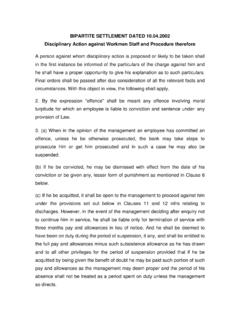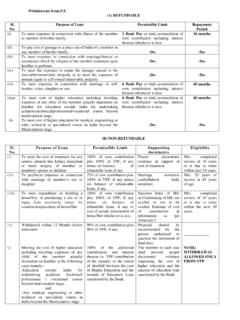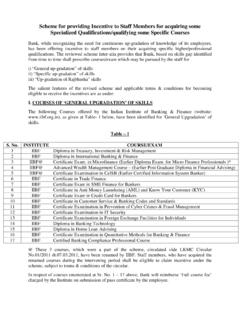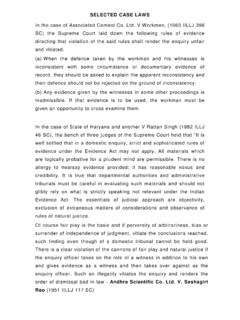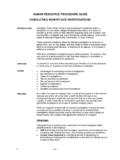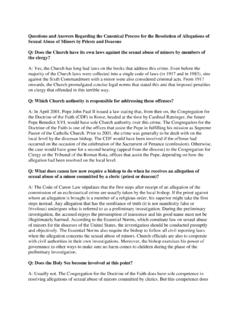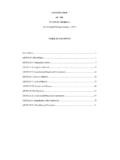Transcription of DOMESTIC ENQUIRY NEED FOR DOMESTIC …
1 DOMESTIC ENQUIRY . NEED FOR DOMESTIC ENQUIRY . For the smooth functioning of an industry, the defined codes of discipline, contracts of service by awards, agreements and standing orders must be adhered to. In the event of an employee not complying with these codes of conduct, he is liable to face disciplinary actions initiated by the Management according to the Standing Order. This procedure is called DOMESTIC ENQUIRY and it is conducted in accordance with the standing order/agreements. CONCEPT. DOMESTIC ENQUIRY is similar to a trial in a court of law, but while a trial in a court is for crimes done against society, DOMESTIC ENQUIRY is conducted for offences committed against the establishment for misconduct, punishable under the standing orders/rules and regulations of the organization.
2 Further, while a trail in a court is in accordance with the criminal procedure code, civil procedure code, evidence act, the DOMESTIC ENQUIRY is conducted in terms of what is known as Natural Justice'. Also, the ENQUIRY officer while examining the evidence and pronouncing on the guilt is not authorized to penalize the employee. It is only the employer or the appointing authority also known as notified disciplinary authority who can pronounce the penalty. DOMESTIC ENQUIRY is not considered as a legal requirement under the Industrial Disputes Act, or other substantive laws such as the Factories act, Mines Act, etc. but has been provided under the standing orders to be framed in the Industrial Employment (Standing Order Act) 1946.
3 As a result it is now well-established that such standing orders have the force of law and constitute statutory terms of employment. The case law established over a long period has made it obligatory for the employers to hold a fair and just ENQUIRY to prove the misconduct before awarding any serious punishment. Dismissal of an employee without holding a fair and just DOMESTIC ENQUIRY amounts to the violation of the principles of natural justice and is frowned upon by the Labour Courts/Industrial Tribunals and adverse conclusions may be drawn against the employer not holding a DOMESTIC ENQUIRY , in so much so that the dismissal without holding a DOMESTIC ENQUIRY is deemed to be illegal.
4 DEFINITION OF THE TERM- DOMESTIC ENQUIRY : Based on the above description of DOMESTIC ENQUIRY , we understand that the term DOMESTIC ENQUIRY is mainly used to refer to an ENQUIRY into the charges of indiscipline and misconduct by an employee. In common parlance, DOMESTIC ENQUIRY means departmental ENQUIRY or DOMESTIC tribunal. In such enquiries, the matter is decided by administrative officers and not by courts of law. In cases of alleged indiscipline, it is common for disciplinary authorities in a department or in an industry to appoint an officer or officers to inquire into the allegations against an employee. These enquiries are commonly known as DOMESTIC Enquiries'.
5 DOMESTIC ENQUIRY AND DEPARTMENTAL ENQUIRY . The term DOMESTIC ENQUIRY ' is commonly used in connection with an ENQUIRY against industrial or commercial workers. On the other hand, the ENQUIRY against Govt. Servant is called as a Departmental ENQUIRY '. But there is no hard and fast rule for use of these terms. Still there are essential differences between the enquiries into the charges against the industrial workers and Govt. Servants. The public servants have their safe guards provided in Article 311 of the Constitution of India. No such provisions are available for industrial or commercial workers. Also, the Public Servants Enquiries Act 1850 is in vogue in the statute book.
6 PRINCIPLES OF DOMESTIC ENQUIRY . 1. Rule of Natural Justice must be observed. 2. The delinquent is entitled to a just hearing. 3. He can call for his own evidence. 4. Cross-examine any witness called by the prosecution. 5. Where rules are laid down, the procedure of such rules must be followed. 6. Disclose to the employee concerned, the documents of records and offer him an opportunity to deal with it. 7. Do not examine any witness in the absence of the employee. 8. The ENQUIRY officer is at liberty to disallow any evidence after recording the reasons in writing. PROCESS OF DOMESTIC ENQUIRY . CHARGE SHEET. When the management comes to know that a particular act of misconduct has been committed by an employee, they should hold a preliminary ENQUIRY into the matter.
7 Such an ENQUIRY may be termed as Fact-Finding ENQUIRY . The delinquent may also be interrogated during the ENQUIRY . The object is to arrive at a conclusion whether a prima facie case exists for taking disciplinary action against the workman concerned. In the preliminary ENQUIRY , if the management is satisfied that an act of misconduct has been committed which would necessitate taking some disciplinary action against the employee concerned, then the charge sheet will be issued. Charge Sheet is not an accusation made or information given in abstract but an accusation made against a person in respect an act committed or omitted in violation. In other words, it is an accusation made against a person in respect of an offence alleged to have been committed by him.
8 The employer cannot justify his action on any grounds other than those contained in the charge sheet. The charge sheet, however, is not expected to be a record of evidence. The person signing the charge sheet is not an accuser. He does not make himself responsible for the truth of the facts set out in charge sheet. He merely tells the accused what he is supposed to have done (Bennet Coleman & Co. LAC 1956). The charge sheet must clearly set forth the charge and ask the delinquent to submit his explanation within a reasonable time, within 24 or 48 hours depending on the gravity of the misconduct. The charge sheet should mention the misconduct committed, the date and time of its commission and the relevant section of the Standing orders under which the misconduct falls.
9 There may, however, be a situation where an employee may commit an act of misconduct which does not fall under the list of misconducts mentioned in the standing orders. Even, in that situation, the employer is at liberty to take disciplinary action for the sake of discipline and proper order in his organization, but the question has to be dealt in a reasonable manner and in accordance with common sense. In the charge sheet, as far as practicable, the same phraseology may be sued as in the standing orders. This would help the worker to understand the charge clearly and the extent of punishment he may be inflicted upon. However, omission to refer the clause of standing orders in the charge sheet does not make it irregular.
10 The Supreme Court in Powari Tea Estate Vs. Barktaki (1965 II LLJ 102), held that the charge must not contain any expression which would give rise to reasonable apprehension in the mind of the workman against whom the ENQUIRY is held that the management has already made up its mind as to his guilt. So, it must only state the misconduct alleged for which the ENQUIRY has to take place. The charge sheet must be signed by a competent authority. Usually, such a competent authority is the Disciplinary Authority who is also authorised to inflict punishment. The charge sheet should be drafted very carefully and served properly. It is important that the charge sheet contains the following details: - Name of the person charged - Employee number - Address - Date, Time & Place of Occurrence - Narration of the misconduct alleged - Relevant clause and specific act of misconduct under the standing orders/ settlement.

